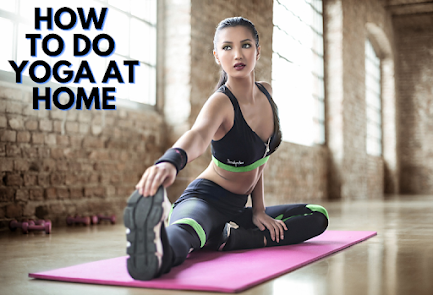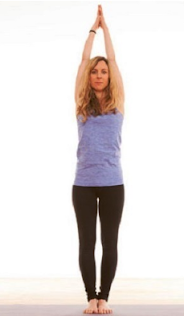How to do Yoga at Home
How to do
Yoga at Home
Learning how to do yoga at home can be
a convenient and rewarding way to improve your flexibility, strength, and
mental well-being.
Here are steps to help you establish a
successful yoga works at home -
Create a Dedicated Space:
Find a quiet, clutter-free area in your home where you can practice. It doesn't need to be large; just enough space for your mat and some extra room to move around.
Gather Your Equipment:
You'll need a yoga mat, comfortable clothing, and possibly props like blocks, straps, or a bolster, depending on your practice. Having a yoga mat bag or basket to keep everything organized can also be helpful.
Read - Top
10 Benefits of Regular Yoga
Choose a Practice Time:
Establish a consistent yoga schedule that works for you. It could be in the morning to energize your day or in the evening to relax before bed. Consistency is key.
Find a Suitable Practice Level:
Select a yoga style and level that matches your experience and fitness level. If you're a beginner, start with basic poses and gradually progress to more advanced ones.
Follow Online Classes:
There are numerous online resources, including YouTube, yoga apps, and websites, where you can find yoga classes led by experienced instructors. Follow along with these videos to guide your practice.
Warm-Up:
Begin your session with a gentle warm-up to prepare your body. This can include some light stretching and deep breathing exercises.
Focus on Breath:
Pay attention to your breath throughout the practice. Deep, controlled breathing is a fundamental aspect of yoga. Coordinate your breath with your movements.
Maintain Proper Alignment:
Proper alignment is crucial to prevent injuries and get the most benefit from each pose. Pay attention to alignment cues provided in online classes or refer to books and resources on yoga alignment.
Progress Gradually:
As you become more comfortable with your practice, you can gradually introduce new poses and sequences. Don't rush; progress at your own pace.
Cool Down and Relaxation:
Finish your practice with a cool-down and relaxation phase. This can include gentle stretches, Savasana (Corpse Pose), or meditation to calm your mind and relax your body.
Read - Yoga
Poses to Release Stress
Keep a Journal:
Consider keeping a yoga journal to track your progress, note how you feel after each session, and set goals for improvement.
Stay Consistent:
The key to success in yoga is consistency. Try to practice regularly, even if it's just for a short duration. Consistency will help you see the most significant improvements.
Listen to Your Body:
Always listen to your body and respect its limits. If a pose feels painful or uncomfortable, modify it or skip it. Yoga should be a practice of self-care, not self-punishment.
Seek Guidance:
If you're unsure about your form or have specific concerns or goals, consider consulting a qualified yoga instructor for personalized guidance.
Enjoy the Journey:
Remember that yoga is a journey, not a destination. Be patient with yourself and enjoy the physical and mental benefits that come with regular practice.
By following these steps and maintaining a
consistent yoga practice at home, you can experience the physical and
mental benefits
of yoga from the comfort of your own home.


.png)
Comments
Post a Comment